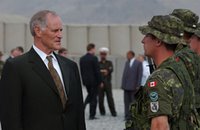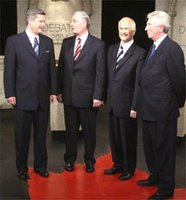Westcoast medicare innovation on the way?
 Right, so first of all, apologies for not having written anything in a while - something like this is easy to lose in the shuffle when you have so much else going on. Essay writing, discussions to organize, people to talk to, etc. At any rate, it's time to get back cracking at this blog thing.
Right, so first of all, apologies for not having written anything in a while - something like this is easy to lose in the shuffle when you have so much else going on. Essay writing, discussions to organize, people to talk to, etc. At any rate, it's time to get back cracking at this blog thing. Apparently there was a Speech from the Throne here in B.C. today. And I thought I was pretty well informed. I guess not. Anyway, I read a bit about it and I like the tone. Especially the bits on health care - the Campbell government is prepared to contradict the Canada Health Act, it seems, in an effort to make medicare more sustainable. "Why are we so quick to condemn any consideration of other systems as a slippery slope to an American-style system that none of us wants?" the speech asks. "Does it really matter to patients where or how they obtain their surgical treatment if it is paid for with public funds?" These are good questions to be asking, and good on Gordon Campbell and his team for being willing to put them forward. The speech proposes a province-wide conversation on health care, and a desire to investigate other, more sustainable models. It also reaffirms the need for public health care, but opens doors to different ways of providing it - this is exactly what's needed. The Canada Health Act has turned into a political tool in Canada, and by whipping it out and promising to defend it tooth and nail, you can paint yourself as the savior of the social programmes that make this country (to a degree) what it is. Paul Martin and Jack Layton, ahem. But it's time to get rid of the dogma surrounding 'defending health care' - yes, it should be accessible to all Canadians, but the B.C. government has hit the nail on the head when they say that it should also be sustainable. We need to be flexible with health care, because I think it's obvious that our current philosophy isn't workable in the long-term. I'll be interested to see what happens in B.C., and kudos again to the B.C. Liberals for taking a risk and posing some good, needed questions. Hopefully we can have a great debate about how best to build a sustainable, accessible health care system.
The One World Scholarship programme, designed to help post-secondary students study in other Pacific Rim nations, is also a great idea - investments in education are wonderful, and I think that facilitating B.C.'s role in the region is also a good idea. Other interesting ideas include community and aboriginal courts to take pressure off of the court system and a more flexible housing strategy for dealing with homelessness. Not sure what those will entail, but they sound like good ideas. Sounds like there's the potential for some neat new ideas in British Columbia - we'll see if Premier Campbell can deliver.
QUEBEC-DATE: Quebec Premier Jean Charest has come out today with a statement along the same lines as the B.C. Throne Speech on Tuesday, promising to look at new ways of guaranteeing accessible, quality health care. Good to hear another province starting to ask some good questions. As we start finding innovations for our public health care system, though, we've got to be careful that we strike a balance and ensure that all Canadians can get the same quality of care. That will be the challenge, to avoid any disparity between public and private elements.













